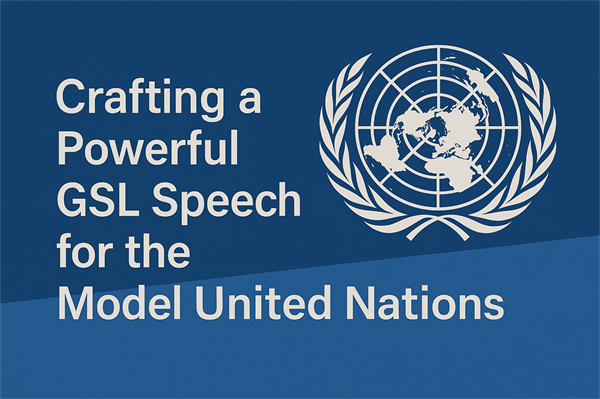Role of an MUN Event Organizer: Behind the Scenes of Diplomacy and Debate
Model United Nations (MUN) events are not just academic simulations — they are platforms for students to experience diplomacy, leadership, and global problem-solving. Every successful MUN conference, however, is the result of careful planning, coordination, and passion from the MUN event organizers. Their role goes far beyond logistics; they create an environment where ideas, culture, and intellect come together in harmony.
In this blog, we’ll explore what it takes to be an MUN event organizer, the responsibilities involved, and how their hard work shapes an unforgettable experience for delegates and participants.
1. Understanding the Role of an MUN Organizer
An MUN event organizer is the backbone of the entire conference. Their role begins months before the event and continues until the last delegate leaves the venue. Organizers ensure that every element — from venue selection to delegate training — runs seamlessly.
They act as planners, coordinators, mentors, and problem-solvers, all rolled into one. They must balance academic preparation, team management, and event logistics while maintaining the educational essence of the MUN experience.
Also Read: FairGaze Model United Nations
2. Planning and Preparation: The Foundation of Success
Every MUN conference starts with a vision. Organizers must decide on a theme that aligns with global issues such as peacebuilding, sustainability, or human rights. Once the theme is finalized, committees are chosen — such as the UNGA, WHO, UNESCO, or UNSC — each dealing with specific global challenges.
The next step is setting up a timeline. Organizers prepare schedules for registration, orientation, and training sessions. They also assign roles like Secretary-General, Chairpersons, and Executive Board members who will lead the committees.
Budgeting plays a key role in the planning stage. From venue costs and printing materials to hospitality and marketing, organizers must ensure financial transparency and resource optimization.
3. Building the Organizing Team
No MUN event can succeed without a dedicated team. The organizer usually forms different departments — logistics, academics, public relations, design, and hospitality. Each department works toward a common goal: creating a memorable and educational experience.
-
Academic Team: Prepares study guides, background papers, and research materials.
-
Logistics Team: Manages the venue, equipment, and technical setup.
-
Public Relations Team: Handles outreach, partnerships, and promotions.
-
Design Team: Creates posters, ID cards, and digital content for branding.
-
Hospitality Team: Takes care of delegates’ comfort, food, and accommodation.
Effective communication and teamwork are crucial. A strong organizer ensures that every team member understands their role and works in sync with the event’s objectives.
4. Promoting the Event
Marketing is vital to attract participants and sponsors. Organizers use social media, school networks, and student communities to promote the event. They design posters, run online campaigns, and connect with educational institutions to invite delegates.
Partnerships with local organizations or media houses can boost the event’s visibility. Creating an engaging website and using platforms like Instagram or LinkedIn helps reach a wider audience.
A good organizer knows how to communicate the value of the MUN — emphasizing skills like diplomacy, leadership, and critical thinking that students will gain from the experience.
5. Academic Preparation and Delegate Training
Before the event, organizers often conduct orientation sessions and workshops to prepare delegates. These sessions cover MUN rules, debate procedures, and drafting of resolutions. This ensures that both new and experienced participants feel confident during the event.
Providing well-researched study guides for each committee is another key task. These guides help delegates understand global issues, country policies, and negotiation techniques. The academic strength of the event depends heavily on the quality of this preparation.
6. The Event Day: Managing the Action
On the day of the MUN, the real challenge begins. Organizers must ensure everything runs smoothly — from registration and committee sessions to cultural performances and closing ceremonies.
Timing is everything. Sessions must start and end on schedule, speakers must be coordinated, and technical equipment must function perfectly. Organizers must stay alert to handle any unexpected issues — whether it’s a missing delegate badge or a sound system glitch.
Hospitality and professionalism make a huge difference. When delegates feel respected and comfortable, they perform better and enjoy the event more.
7. Post-Event Responsibilities
The work doesn’t end when the closing ceremony concludes. A good MUN organizer conducts feedback sessions, collects suggestions, and acknowledges the contributions of volunteers and partners.
Post-event reports, social media highlights, and thank-you notes to sponsors help maintain relationships for future editions. Reflecting on challenges and achievements helps improve the next MUN.
8. Qualities of a Great MUN Organizer
To be an excellent MUN event organizer, one needs a mix of leadership, communication, and problem-solving skills. Some essential qualities include:
-
Organization: Managing multiple tasks efficiently.
-
Teamwork: Leading diverse teams with empathy.
-
Adaptability: Handling unexpected challenges calmly.
-
Creativity: Bringing innovation to event design and execution.
-
Professionalism: Maintaining discipline and ethical conduct.
These qualities ensure that the event remains not only successful but also impactful and inspiring.

Comments
Post a Comment